 Petzlover
Petzlover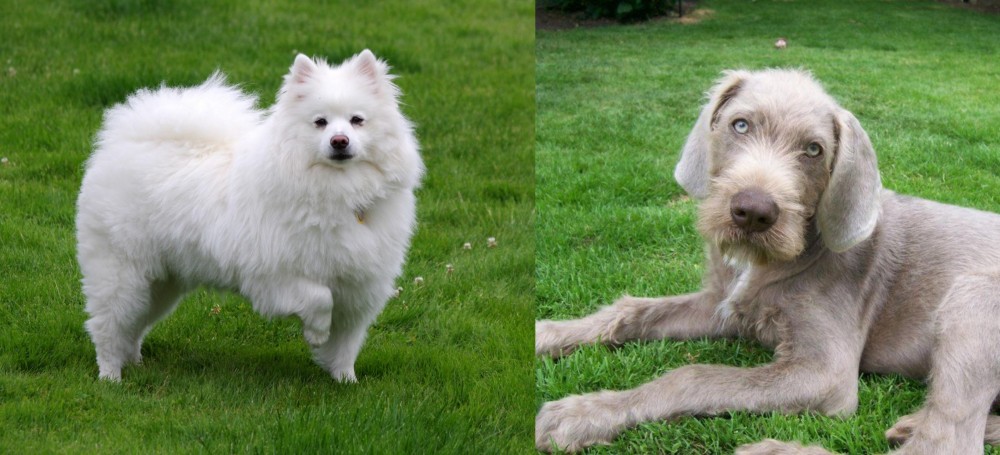 American Eskimo Dog is originated from United States but Slovakian Rough Haired Pointer is originated from Slovakia. American Eskimo Dog may grow 20 cm / 7 inches shorter than Slovakian Rough Haired Pointer. American Eskimo Dog may weigh 19 kg / 41 pounds lesser than Slovakian Rough Haired Pointer. Both American Eskimo Dog and Slovakian Rough Haired Pointer has same life span. Both American Eskimo Dog and Slovakian Rough Haired Pointer has almost same litter size. American Eskimo Dog requires High Maintenance. But Slovakian Rough Haired Pointer requires Low Maintenance
American Eskimo Dog is originated from United States but Slovakian Rough Haired Pointer is originated from Slovakia. American Eskimo Dog may grow 20 cm / 7 inches shorter than Slovakian Rough Haired Pointer. American Eskimo Dog may weigh 19 kg / 41 pounds lesser than Slovakian Rough Haired Pointer. Both American Eskimo Dog and Slovakian Rough Haired Pointer has same life span. Both American Eskimo Dog and Slovakian Rough Haired Pointer has almost same litter size. American Eskimo Dog requires High Maintenance. But Slovakian Rough Haired Pointer requires Low Maintenance
 The American Eskimo is derived from the Nordic Spitz breed and most closely related to the German Spitz in particular. There were many German Spitzes in the United States at the time of the second World War and anti-German sentiment caused its name to change to the American Eskimo Dog. However, as the breed developed over time in the States, the American Eskimo became its own separate breed. In addition to the German Spitz, the American Eskimo is also related to the white Keeshond, the Samoyed, the white Italian Spitz and the white Pomeranian.
The history is beginning to show that the Spitzes that were brought to the US in the early 1900’s was white. This color was not popular in Europe but was quickly the favorite in the United States. They were originally working dogs on farms and ranches. They have excellent herding instincts, make goo watch and guard dogs, and good law enforcement sniff dogs. However, their first introduction to the American public was through the Cooper Brothers’ Railroad Circus and Stout’s Pal Pierre at the Barnum and Baily Circus. Eskimo puppies were sold after the circus show.
The American Eskimo is derived from the Nordic Spitz breed and most closely related to the German Spitz in particular. There were many German Spitzes in the United States at the time of the second World War and anti-German sentiment caused its name to change to the American Eskimo Dog. However, as the breed developed over time in the States, the American Eskimo became its own separate breed. In addition to the German Spitz, the American Eskimo is also related to the white Keeshond, the Samoyed, the white Italian Spitz and the white Pomeranian.
The history is beginning to show that the Spitzes that were brought to the US in the early 1900’s was white. This color was not popular in Europe but was quickly the favorite in the United States. They were originally working dogs on farms and ranches. They have excellent herding instincts, make goo watch and guard dogs, and good law enforcement sniff dogs. However, their first introduction to the American public was through the Cooper Brothers’ Railroad Circus and Stout’s Pal Pierre at the Barnum and Baily Circus. Eskimo puppies were sold after the circus show.
It was then that the breed became one of America’s favorite breeds and they quickly became house pets. Following World War II, Japan exported the Japanese Spitz into America and it was crossed with the Eskimo also. The American Eskimo Dog breed was not recognized by AKC until 1985. Still in 1958 there was no official breed club in the States but there were growing numbers of the dogs. It was not until 1970 did the National American Eskimo Dog Association (NAEDA) come into being. They collected the pedigrees of the first 1750 dogs to be AKC registered.
Since the American Eskimo Dog is not recognized internationally, those wishing to participate in international competition such as England’s prestigious Cruft’s Dog Show must register their dogs a German Spitz. Despite this the American Eskimo and German Spitz remain two very different breeds.
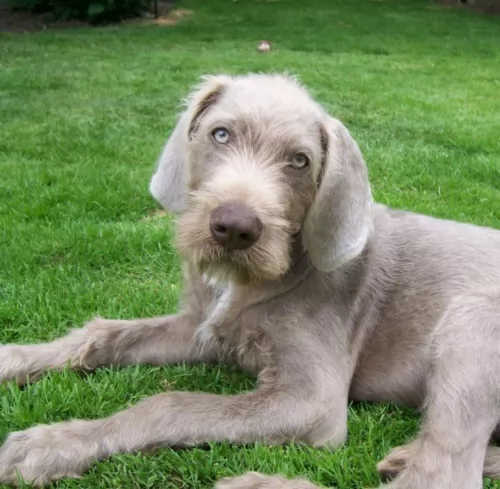 The Slovakian Rough Haired Pointer is a gundog from Slovakia. The dog came about by crossing the Cesky Fousek, German Wirehaired Pointers and Weimaraners. Other names for this dog include Slovensky Hrubosrsky Stavac.
The Slovakian Rough Haired Pointer is a gundog from Slovakia. The dog came about by crossing the Cesky Fousek, German Wirehaired Pointers and Weimaraners. Other names for this dog include Slovensky Hrubosrsky Stavac.
Developers were looking for a dog with good stamina – a dog capable of tracking hares and birds. The dog was first introduced into the United Kingdom in 1997.
 This small to medium dog is beautiful and resembles a miniature Samoyed. There are three sizes of American Eskimo – the standard, miniature, and the toy. The Eskimo’s head is wedge shaped with tall, triangular, erect ears. It has a heavily plumed tail with a sharp curl over the back. The Eskimo can burst into bold action due to their good legs and feet.
This small to medium dog is beautiful and resembles a miniature Samoyed. There are three sizes of American Eskimo – the standard, miniature, and the toy. The Eskimo’s head is wedge shaped with tall, triangular, erect ears. It has a heavily plumed tail with a sharp curl over the back. The Eskimo can burst into bold action due to their good legs and feet.
The coat is a double one with a harsh outer coat and plush inner one. The coat is always white or white with cream or biscuit markings, and visible skin in gray or pink. The American Eskimo’s ruff or mane is very heavy, and the nose, eyelids, pads and gums are black. They have dark eyes and blue are not allowed.
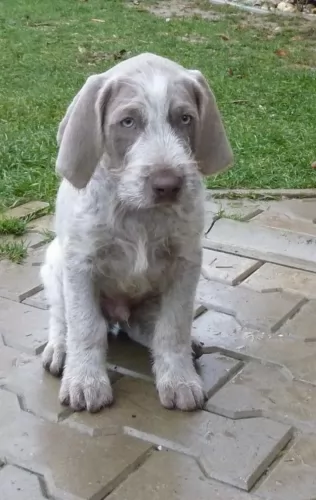 The Slovakian Rough Haired Pointer has got some looks from each of the dogs he was derived from. He is a fairly large dog and the coat is short to medium length and harsh and wiry and he has some additional hair around the face area.
The Slovakian Rough Haired Pointer has got some looks from each of the dogs he was derived from. He is a fairly large dog and the coat is short to medium length and harsh and wiry and he has some additional hair around the face area.
Most times the coat is a grey-brown shade. The ears are medium length and floppy and the tail is mostly docked at 50% of natural length, although these days it is often left long. It is carried downwards when at rest but raised when in action.
This is an energetic dog that is going to need a lot of exercise, so he won’t suit living with people who aren't active. He just loves to be outside and will thrive on a farm.
He is good with children and other dogs, but training and socialization should be provided for this dog. He is intelligent and will learn easily.
They’re affectionate dogs and their social nature makes them ideal for lively families. Because he is so active he is best suited for living in the suburbs or the countryside as opposed to living on a small property in the city.
 The Eskimo is affectionate, playful and love children of all ages. They are intelligent and want to please you. They can be trained easily and are champions of the obedience trial. They are fun and confident. At the same time, they need a confident pack leader. He is prone to Little Dog Syndrome where the dog thinks they oversee the home and display all sorts of behaviors. Under these circumstances the American Eskimo can become obsessive, aggressive, and engaging in obsessive resource guarding and barking.
The Eskimo is affectionate, playful and love children of all ages. They are intelligent and want to please you. They can be trained easily and are champions of the obedience trial. They are fun and confident. At the same time, they need a confident pack leader. He is prone to Little Dog Syndrome where the dog thinks they oversee the home and display all sorts of behaviors. Under these circumstances the American Eskimo can become obsessive, aggressive, and engaging in obsessive resource guarding and barking.
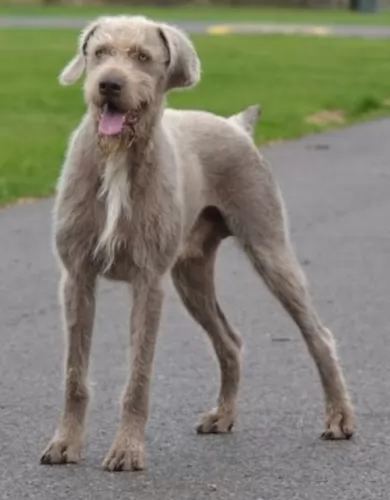 People who have owned these dogs rave about their loyalty and affection. They’re also intelligent and become very well behaved as they are dogs that also want to please their owners.
People who have owned these dogs rave about their loyalty and affection. They’re also intelligent and become very well behaved as they are dogs that also want to please their owners.
They’re gentle dogs too, just wanting to be loved by their human family and craving attention.
They’re also regarded as low maintenance pets and all these positive aspects of this dog make him a splendid choice if you're looking for a wonderful pet and companion
 The American Eskimo Dog is prone to hip dysplasia. Their eyes and tear ducts are potential issues with progressive retinal atrophy. They are allergic to fleas and have a tendency to be overweight.
The American Eskimo Dog is prone to hip dysplasia. Their eyes and tear ducts are potential issues with progressive retinal atrophy. They are allergic to fleas and have a tendency to be overweight.
We deal with PRA (Progressive Retinal Atrophy) in greater detain in a following section but it is not as destructive as it used to be. It is much more treatable now.
There are potentially some dental issues that some American Eskimo Dogs are prone to.
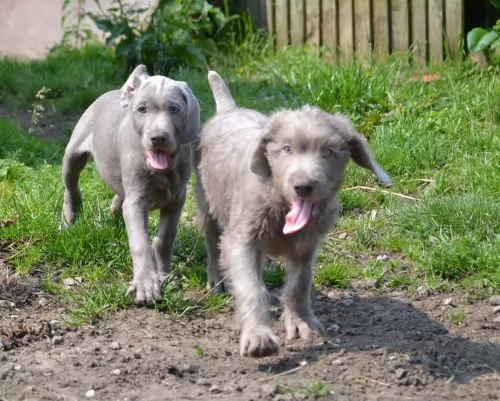 Your Slovakian Rough Haired Pointer can reach 14 or 15 years of age if he is looked after well but hip dysplasia is a threat for any dog.
Your Slovakian Rough Haired Pointer can reach 14 or 15 years of age if he is looked after well but hip dysplasia is a threat for any dog.
Any aged dog can be affected and this mobility disease is caused when the hip joint develops abnormally. Although hip dysplasia is genetic, environmental factors can also play a part. The idea is to get treatment from the vet so that your canine friend isn’t in pain.
This can cause so many problems in the body and not just the teeth. Have your dog’s teeth checked regularly and have them cleaned.
Your dog can have neck or back pain from this ailment, occurring when the discs and vertebrae of the spine become infected. Provide your dog with healthy food to ensure a strong immune system to fight off diseases like this.
 Your American Eskimo Dog needs a high quality food so they will not get overweight. Make sure you know how much is appropriate for your particular dog and her specific age. The puppies should be fed twice a day but adults only once.
Your American Eskimo Dog needs a high quality food so they will not get overweight. Make sure you know how much is appropriate for your particular dog and her specific age. The puppies should be fed twice a day but adults only once.
As previously mentioned the American Eskimo Dog is prone to eye issue such as Progressive Retinal Atrophy or (PRA) – this disease is inherited and used to cause blindness as the rods in the retina died. New medical discoveries mean this is no longer a hopeless disease. Their eyes are also susceptible to other issues so make sure you check them and the tear ducts regularly.
Like so many other breeds the American Eskimo is also susceptible to hip dysplasia and a moving patella in the knee. For this reason watch their weight. They can also be very allergic.
This small dog has more energy than his size can handle. He needs a lot of exercise and a place to run. If he will become hyperactive and destructive. They are prone to disturbing behaviors such as spinning (spinning in circles) when they don’t get enough exercise. The American Eskimo Dog is smart and agile, Play games like catch or agility. They are also great at herding, competitive obedience or detection.